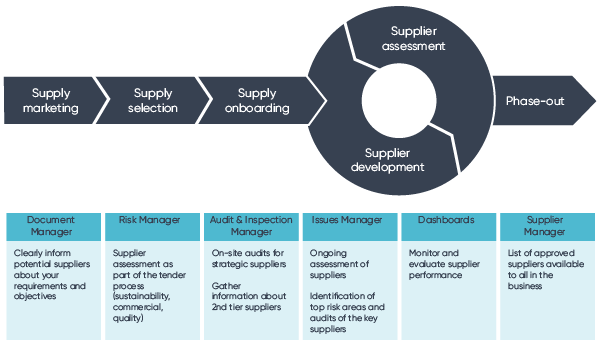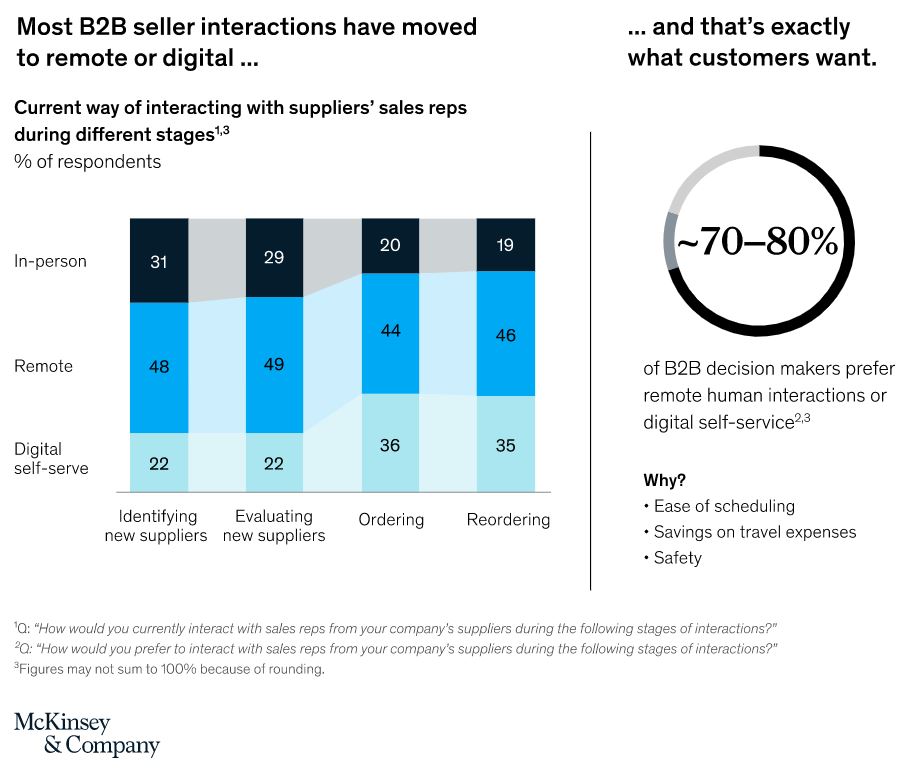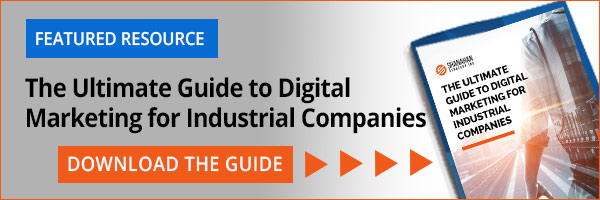One of the quickest ways to scale up your small business is to secure valuable supplier contracts with big companies. In a high-stakes, increasingly competitive market grappling with the ongoing strains of a pandemic, that’s often easier said than done. If you want to become a supplier for big companies, you’re in the right place.
This article will cover essential steps to prepare your business for prospecting important clients. By the end, you’ll be able to gauge how prepared you currently are and what actionable steps you should take to improve your marketability.
Key Takeaways
- Invest in your equipment, technology, data, website, and digital marketing strategy.
- Your response time to leads has a bigger impact on a first impression than you might realize. Be timely and thorough with communication.
- Explore local sourcing partners and certification opportunities to make your business more appealing for both B2B and B2C buyers.
- A unique selling proposition (USP) helps your business stand apart from the competition.
- Research your ideal clients before you contact them. Be honest and open about sharing financial information and inviting prospects to tour your facilities.
8 Steps to Become a Supplier for Top Brands
Competition is fierce, especially when you’re bidding for big contracts. Whether you’re upgrading your marketing strategy, going through risk assessment, or preparing for an on-site audit, your company has to make a powerful first impression every time you advance to the next phase of the selection process.

If you want your business to beat the competition at each stage and become a top supplier to the largest national or international companies in your industry, follow these tips.
1. Invest in the Right Technology and Data
Relying on obsolete technology and outdated systems is one of the fastest ways to find yourself crossed off a shortlist.
Data has been an important driving factor for years, but recent pandemic-related supply chain issues have shined a spotlight on how critical data quality is for successful relationships between businesses and suppliers.
Automation improves speed and efficiency while reducing human error. Accurate data collection enables real-time monitoring so suppliers and their partners can identify supply chain bottlenecks and other issues.
Buyers expect suppliers to consolidate siloed data into a single dashboard for maximum efficiency. If you can’t deliver with up-to-date technology and data analytics, chances are your competitors are beating you on this front while top contracts pass you by.
2. Get Your Response Time Down to 24 Hours or Less
B2B sales teams take an average of 42 hours to respond to a new lead. If your business falls into that average, you’re too slow. Meanwhile, businesses that respond in five minutes or less are 100x more likely to convert opportunities.
How you respond is just as important as how quickly you respond. These tips will help you make a good first impression:
- Send follow-up emails after a phone call to summarize the discussion.
- Respond to every question or concern in a message. Focusing on certain topics while skipping over others sends a red flag to the prospect.
- Try to anticipate additional questions that might arise based on your response. Be thorough and answer them before they have to ask.
- Proofread your reply before sending it to check for typos and ensure the content is accurate. Don’t be afraid to ask someone else to read it over before sending it.
- Consider offering an online resource library to send extra marketing materials such as whitepapers, case studies, product information, testimonials, etc.
Your reply says a lot about how you run your business. Are you quick to respond and thorough with your answers? Or are you too slow with an incomplete reply that pushes your prospects to competitors instead?
3. Scale Up Digital Marketing Efforts
The COVID-19 pandemic has had an undeniable effect on B2B sales interactions. More than 75% of buyers and sellers say they prefer remote engagement and digital self-serve contact over face-to-face interactions. Only about 20% say they hope to return to in-person sales once the pandemic is behind us.

What does this mean for businesses hoping to become suppliers that land big contracts with top companies?
If you’re not already committed to digital marketing, now is the time to get on board. Your company needs to be online.
Digital marketing for suppliers includes:
- Web design
- Website optimization
- Search engine optimization
- Email marketing
- Content marketing
- Paid advertising
- Online product catalogs
- Social media
Word-of-mouth referrals and cold calling alone aren’t going to put your business in the position it needs to be in for big contracts.
One of the first courses of action a corporation often takes when considering shortlisted suppliers is to do online research. If your business doesn’t have a strong online presence, you’re already behind the competition.
4. Make Sure Your Operations and Finances Are Ready for Inspection
Fortune 500 companies often request suppliers to furnish their financial statements as part of the approval process. They want to verify that businesses are upfront, honest, and have the resources needed to meet the commitments they made.
When your company is vetted, a representative may also want to inspect your facility. The procurement officer will likely check:
- Overall cleanliness and organization
- Safe working conditions
- State of your equipment
- Up-to-date software
- Workplace culture
If a representative walked into your operations facility today, would your business give them a great first impression? Or do you need to do some serious housekeeping before you’re ready to entertain guests?
5. Build Your Supply Chain with Local Partners
Global supply chains encountered new strains and challenges during the pandemic. As a result, buyers and suppliers have been looking for ways to reduce supply chain bottlenecks, delays, risks, and volatility.
One solution is to source local suppliers.
75% of consumers plan to shop more locally sourced products and neighborhood stores, and B2B has been following this trend too. Choosing local supply partners brings a host of benefits that appeal to your potential business partners:
- Flexibility: Local suppliers can typically react to problems and disruptions faster than suppliers on the other side of the globe.
- Control: The closer your supply chain is, the more control you have over it. Locally sourced partners are more accommodating and can be available for in-person meetings, site tours, etc. to make sure everything is running smoothly.
- Community: Local sourcing generates revenue that supports the local economy and benefits the community. As a business supporting other local businesses, you’re fostering a healthy ESG position that shows prospects you’re socially conscious.
- Environment: Another ESG benefit is your environmental impact. Reducing your company’s shipping and storage needs lowers your emissions, carbon footprint, and energy usage. Going green is a positive selling point for B2B and B2C buyers.
- Reduced Costs: Tightening your supply chain reduces costs on logistics, duties, storage, and other expenses.
- Communication: Sourcing locally eliminates frustrating communication issues such as dealing with language barriers or experiencing delays caused by operating in different time zones.
Building a sustainable, flexible, close-to-home supply chain with local partners will benefit your bottom line and make your company more appealing to become a supplier for big businesses.
6. Create an Impactful Unique Selling Proposition (USP)
A unique selling proposition is a concise statement that explains what your business can offer and how it’s different from competitors in the same industry. In short, your USP tells prospects why you’re the best at what you do.
A strong USP is the marketing hook that helps your business stand out. This selling point increases the value of your products and services. When a prospective buyer is considering their shortlist and weighing your company against a competitor, you need to communicate why you’re unique and able to offer benefits that other people can’t.
Your USP should be solution-focused, benefits-focused, and creative if it’s going to make an impact.
7. Explore Certification Options
Do you run a minority-owned business? If at least 51% majority of the small business owners are LGBTQ+, women, veterans, disabled, or a minority, your company may be eligible for certification.
Certifying your business as minority-owned may give you an edge over your competitors for preferential treatment when you’re vying for supplier contracts.
8. Research Your Ideal Companies
As with every business endeavor, you shouldn’t dive in blind. If you want to become a supplier for big corporations, you need to do the research ahead of time.
Demonstrate that you are the best candidate not because you have the most impressive list of accomplishments, but because you’re familiar with your prospect’s needs, problems, and goals, and you can offer a personalized solution.
When you’re exploring big companies to partner with, follow these tips:
- Study the corporation’s website. Does your business align with the company culture? Can you offer them something they need?
- Find a supplier checklist. Make sure you meet all of the qualifications before you initiate contact.
- Understand the business’s pain points and offer a solution. Prove that you aren’t just blindly pitching your services to anyone and everyone – you know exactly to whom you are pitching and how you will deliver on your promises.
Become a Supplier That Wins Top-Level Contracts
Landing a dream account with a big corporation isn’t easy. The market is overflowing with competition, and the pandemic has accelerated new trends while adding extra strain on the existing supply chain infrastructure.
Remember that searching for the optimal supplier can be a stressful experience. Your job is to make the decision easier. Be accessible and communicative. Understand the buyer’s expectations and make sure you know what information you need to provide, what questions to ask, and how to deliver the solutions your prospect needs.
We specialize in helping our clients develop a strategic framework to facilitate long-term growth. If you’re ready to up your game and become a supplier for big companies in your industry, contact us to see how we can help you optimize your business.

